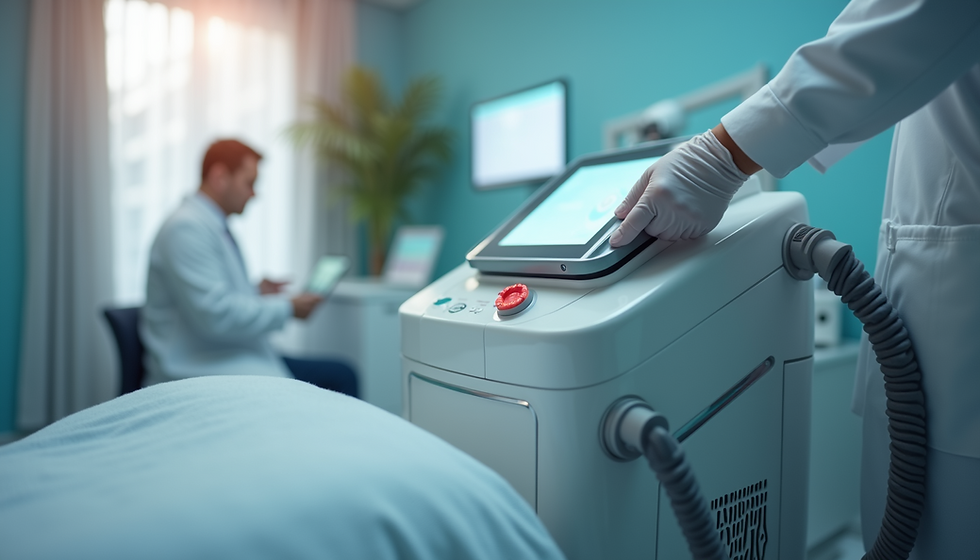Unveiling the Top 5 Causes of Acne and Their Effective Treatment Solutions
- Sameer khan
- Jul 17
- 3 min read
Acne is not just a teenage problem; it can affect anyone, from pre-teens to adults in their 30s and even beyond. In fact, studies show that nearly 50 million Americans have acne. Understanding the reasons behind breakouts is the first step toward finding effective solutions. Here, we will discuss the five primary causes of acne along with proven treatment strategies.
Hormonal Changes
Hormones play a huge role in acne development. During puberty, the body releases more androgens—hormones that stimulate oil glands. This increased oil production can lead to clogged pores and breakouts.
For women, hormonal changes related to the menstrual cycle, pregnancy, or contraceptive use can trigger acne flare-ups. About 70% to 95% of women experience acne at some point in their lives due to these fluctuations.
To manage hormonal acne, treatments such as hormonal therapy can be effective. For example, birth control pills can stabilize hormone levels, while medications like spironolactone lower androgen levels. Additionally, over-the-counter products containing salicylic acid can help by clearing clogged pores and reducing inflammation.

Bacteria and Inflammation
Propionibacterium acnes is a bacterium that can aggravate acne when pores become blocked with excess oil and dead skin. When bacteria multiply, they trigger an inflammatory response, leading to painful breakouts.
To fight this type of acne, use products that contain benzoyl peroxide, which is known for its antibacterial properties. Research shows that benzoyl peroxide can effectively reduce bacteria by over 90% within a few days when applied correctly. Additionally, maintain a consistent skincare routine by cleansing your face twice daily and avoiding picking at existing pimples to minimize inflammation.
Diet and Insulin Resistance
Your diet can greatly influence your skin. Foods high in sugar and refined carbohydrates can lead to spikes in insulin levels. For instance, consuming a diet rich in high-glycemic foods like white bread and sugary snacks not only raises blood sugar but can also lead to increased oil production.
To improve skin health, consider a diet filled with whole foods: think fruits, vegetables, whole grains, and lean proteins. Some studies also link dairy consumption to acne development, suggesting that reducing dairy might help some individuals.
Integrating topical treatments such as retinoids can be effective to prevent clogged pores and help regulate skin cell turnover. If you're struggling despite dietary changes, consult a healthcare professional to explore systemic treatments like oral medications.
Stress
Stress is a common but often overlooked trigger of acne. When you're stressed, your body produces more cortisol, which increases oil production in the skin. This can worsen existing acne or cause new breakouts.
Managing stress is essential. Activities such as yoga, meditation, and regular exercise can help lower stress levels. A study indicated that 30 minutes of moderate exercise most days can significantly reduce stress. If stress negatively impacts your wellbeing, consider speaking to a mental health professional for additional support.
Skincare Products and Over-cleansing
Not all skincare products are created equal. Using heavy creams and oils can clog pores, while overly aggressive scrubs can irritate the skin, exacerbating acne. Over-cleansing is another pitfall, as it strips the skin of natural oils, which ironically leads to increased oil production.
When choosing products, look for non-comedogenic labels, which indicate they won’t clog pores. Opt for gentle, sulfate-free cleansers, which are effective without over-drying the skin. Additionally, gently exfoliating a couple of times per week can help, but be cautious—overdoing it can be detrimental. Remember to patch-test new products to avoid adverse reactions.
Final Thoughts
By understanding the key factors that contribute to acne, you can take meaningful steps toward effective treatment. Hormonal changes, bacteria, diet, stress, and the selection of skincare products all play crucial roles.
It's important to remember that individual responses to treatment vary. Consulting with a dermatologist can provide tailored advice and options suited to your specific needs.
With patience and the right approach, clearer skin is achievable. Take proactive steps to manage your skin health and empower yourself in the journey toward clearer, healthier skin!

.png)


Comments